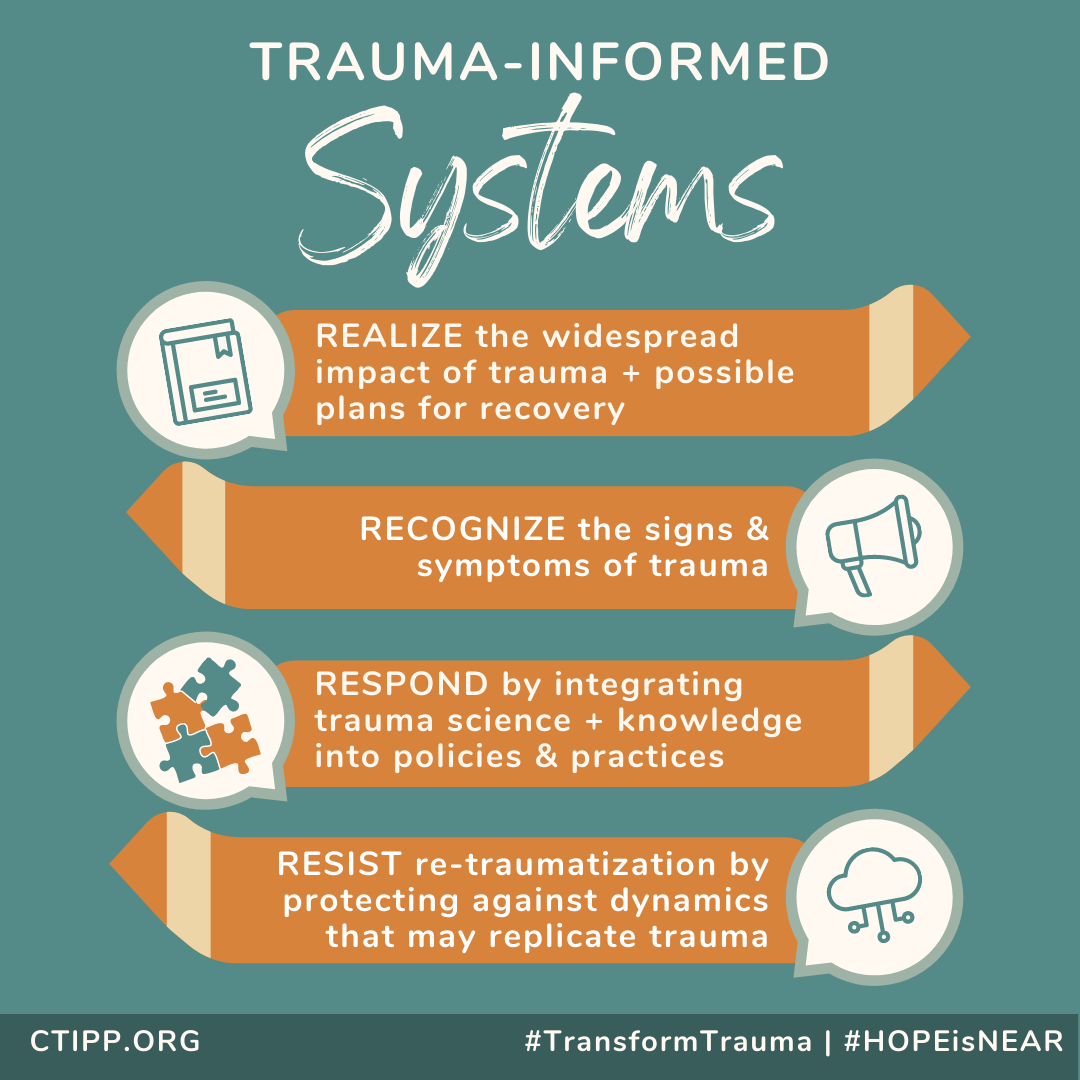| | We hope you had a restful and relaxing Labor Day weekend and are ready for the 2022-2023 school year. CTIPP is thrilled to announce a new report for advocates, policymakers, and media focused on promoting trauma-informed educational policies and practices. Trauma-informed school environments and out-of-school-time programming can bolster individual and collective resilience in the face of ongoing stress and hardship, ultimately creating more opportunities for all students to experience well-being. It is well-established that when school environments provide the context and conditions for all students to learn, heal, and grow, young people live better, healthier, happier, and more successful lives, which supports a stronger society in the long run. Co-authored by CTIPP's Jen Curt and Peyton Barsel, this report makes the case for trauma-informed schools, suggests transformative elements to embrace, and highlights two examples of school trauma-informed initiatives. We hope you find the report useful to your advocacy and implementation efforts - and we look forward to your feedback! Sincerely, Your Friends at CTIPP | | |  | MINDFUL MOMENT: The Buddhist mindfulness teacher Thich Nhat Hanh suggested that “with each step, a gentle wind blows.” On your next walk, pay attention to each step. Notice how many steps you take during each inhale and exhale and at the speed you’re walking. Match your steps to your breath. For example, as you breathe in, count 1-2-3 steps. As you breathe out, count 1-2-3 steps. Let your lungs and feet come to a happy equilibrium as you chant a favorite mantra in your mind. | | | | | | | | Apply for ReCAST Funds: SAMHSA is issuing ten ReCAST (Resiliency in Communities After Stress and Trauma) grant awards of up to $1 million per year for up to four years to promote resilience, trauma-informed approaches, and equity in communities that have recently faced civil unrest, community violence, and/or collective trauma within the past 24 months; and assist high-risk youth and families through the implementation of evidence-based violence prevention, and community youth engagement programs. Deadline to apply: October 17, 2022. | | | Interested in Briefing Your Federal Legislators? CTIPP is offering to partner, coordinate, and set up the logistics, so you can virtually brief your U.S. Senate and House representatives on trauma-informed policies and practices in your community, sector, or system. Simply book a "Chat & Chew" with Jen Curt, CTIPP's Director of Government Affairs to get started. | | | Urge Congress to Re-Authorize the Maternal Infant Early Childhood Home Visiting (MIECHV). MIECHV has been shown to help parents break the cycles of trauma and poverty by providing support and teaching skills needed to achieve financial stability and to help raise healthy, happy, thriving children. MIECHV funding is due for reauthorization this year; without it, tens of thousands of families will lose access to these essential programs. We are urging Federal representatives to re-authorize funding and increase it by $1 billion in the next five years. | | | | | | | | Tuesday, September 13: Join the Climate Community of Practice (Climate CoP) informational call, which will educate, connect, and empower participants to build population-level capacity for mental wellness and transformational resilience. We realize that the onus of the problem must not be placed on individuals and communities without acknowledging and working toward systemic change that creates avenues toward sustainability. And yet, we must also help build the necessary capacity to withstand the global impacts of climate change. | | | Weds, September 21: Join CTIPP’s next Community Advocacy Network (CAN) call will feature Dr. Kate Tumelty Felice and Rob Czepiel with Resilient Minds on the Front Lines. The New Jersey-based nonprofit supports frontline workers to build practices that promote wellbeing and foster resilience. SEE ALSO: Our August CTIPP CAN call featured a conversation with Dan Press, one of CTIPP’s founders and general counsel, and Jesse Kohler, CTIPP’s executive director, to inform the movement’s vision toward a trauma-informed society. | | | Tuesday, October 4: Join Invest in the Future: Policy Strategies that Support Healthy Child Brain Development for a briefing on child neurobiology research showing that family support policies have a positive impact on brain development in infancy/childhood. Co-hosted by the National Prevention Science Coalition to Improve Lives (NPSC) and the FRONTIER program at the Frank Porter Graham Child Development Institute, University of North Carolina, Chapel Hill. | | | | | |  | August 2022 Washington, DC Update: From legislation and new funding to midterm elections, check out the latest trauma-informed federal update from Jen Curt, CTIPP’s Director of Government Affairs. | | |  | Infographics: Need fresh infographics for your social media, website, and/or emails? We’ve updated our National Trauma Campaign graphics to match our new brand and website. Enjoy! | | | | | | | | | | | | | | Campaign for Trauma-Informed Policy & Practice
1050 Thomas Jefferson Street NW Seventh Floor | Washington, District of Columbia 20007
(215) 370-1362 | jesse@traumacampaign.org | | | | | | | | | | | |